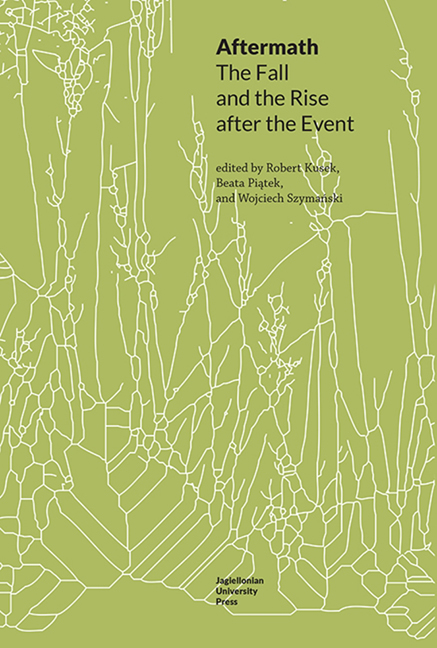In the Wake of the Event
Published online by Cambridge University Press: 06 November 2021
Summary
In 2012, the British-Canadian novelist Rachel Cusk published a memoir entitled Aftermath, the third volume in her genre-bending collection of auto/biographical writings which started with A Life's Work: On Becoming a Mother in 2001, and continued with The Last Supper: A Summer in Italy – her take on the Italienische Reise – released in 2012. Subtitled On Marriage and Separation, Aftermath was published not only in the aftermath of an unprecedentedly hostile reaction to her previous auto/biographical narratives (see Kusek 2017: 149), but also in the aftermath of the writer's separation from her husband.
The notion of aftermath, this consequence of an event whose nature is unfortunate and disastrous, remains the book's central metaphor. In principle, Aftermath is vitally concerned with the notion of after-effects, with what happens when “the gears of life [go] into the reverse” (Cusk 2013: 2) and, consequently, provides its readers with a documentation of the “disorder,” “fragmentation,” and “impermanence” (26, 94) that are brought about by a traumatic event. A sense of loss is, perhaps, best illustrated by Cusk being forced to extract one of her teeth which – much like her marriage – is diagnosed as being “beyond repair” (29). The writer’s concern with what happens to “the world of the mouth” when its integral part becomes removed, “what happens when the tooth is gone” (31–32), is tantamount to her apprehension regarding one's condition in the wake of an ordeal. In short, Cusk acknowledges the fact that the new principle of her life is that of “chaos” and “brokenness” (2); that her new situation is a regression and not progress; that her marriage was synonymous with civilisation and that now “the barbarians are cavorting in the ruins” (122). “I no longer have a life,” she says. “It's an afterlife; it’s all aftermath” (91).
However, as early as in the first chapter of her memoir, Cusk introduces another meaning of aftermath: the idea of “second mowing” – “a second crop of grass that is sown and reaped after the harvest is in” (5) – which she borrows from her history teacher, Mrs. Lewis. She recalls the teacher’s particular fondness for post-Roman, early Saxon Britain, for the “new reality” and “the aftermath of that megalomaniacal all-conquering unity” that was guaranteed by the Roman Empire (ibid.).
- Type
- Chapter
- Information
- AftermathThe Fall and the Rise after the Event, pp. 9 - 22Publisher: Jagiellonian University PressPrint publication year: 2022



